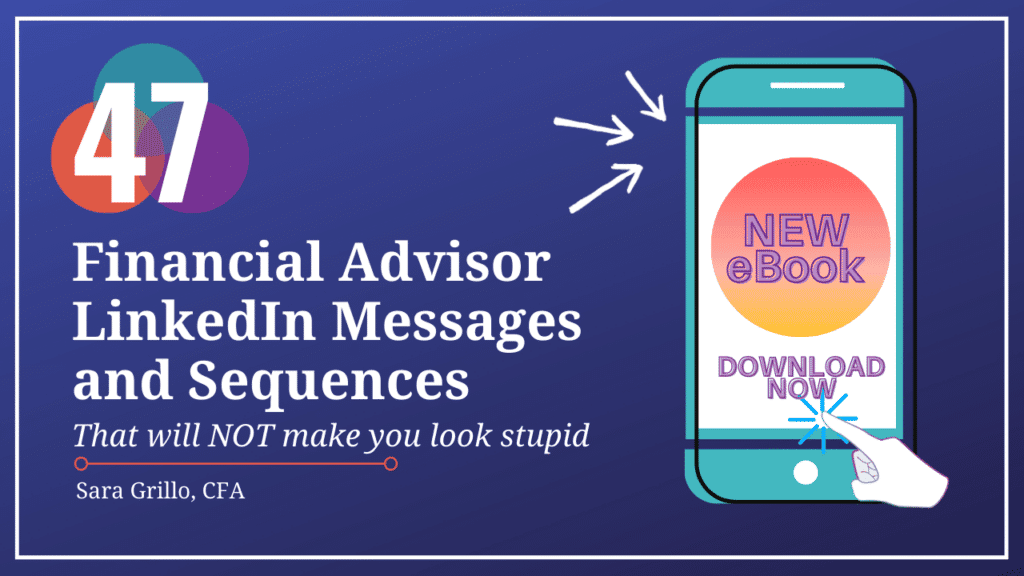Podcast: Play in new window | Download
Being a financial advisor for widows requires a high degree of empathy and compassion. In this podcast, Kathi Balasek joins us to teach how to “speak widow” – what to say and do (and what not to) if you want to sensitively relate to a widow in grief. Kathi is a grief communication consultant and the founder of the One Well Widow Podcast.
We’ll discuss:
- Why current and future widows are your clients.
- What is “speaking widow”?
- What is grief literacy?
- Why you should ask to learn not to fix
- Why is grief leadership so important now?
- Where financial advice and grief literacy collide – best practices to follow
- What widows look for in an FA and why they leave you.
For those of you who are new to my blog/podcast, my name is Sara. I am a CFA® charterholder and I used to be a financial advisor. I have a weekly newsletter in which I talk about financial advisor lead generation topics which is best described as “fun and irreverent.” So please subscribe!
It takes one comment to ruin a relationship with someone in grief
It just takes one insensitive comment while someone is in grief to ruin an entire relationship.
A few years ago I had this one client who was this investment firm. The guy who ran it was really passionate about human rights and always on a soapbox about this or that UN sustainable goals or whatever. The parkland massacre happened the day we had our weekly meeting. If you know me you know that I am suuuper protective of all children. So this was really hard for me to cope with and I got a little emotional in the meeting. I wasn’t hysterical or anything but tears came to my eyes as I was talking about it.
Well he turns around and says something like, “look these things happen. You shouldn’t get so dramatic about it.”
Come on bro. Are you kidding me?
What a jerk.
I mean, there I was showing a rare moment of vulnerability and he totally just, well, I kinda felt like he kicked me when I was down. I already feeling bad and he took that emotion, shamed me for it, and so I had to deal with that on top of it all.
After that, I never saw him the same. I continued to work with him but I never really believed in all of his rhetoric about human rights. A few months later the relationship ended and to do this day I consider him a total a-hole and I want to have nothing to do with him.
That’s an extreme example but it does show you how one insensitive comment can destroy an entire relationship when someone is in a vulnerable position.
What do you say to someone in grief, and how does that apply to those who want to be a good financial advisor for widows? Let’s talk about it.
If they don’t love you, they’ll leave you!
Kathi became a young widow with five children in her thirties. Prior to her husband’s passing, Kathi never took an active role in the financial planning. This situation is pretty typical. Within a year, she had fired her former advisor and moved on a new one. She just felt there wasn’t enough rapport or trust for her to accept the person’s financial advice.
Often widows wind up leaving their financial advisors for this very reason. This piece about why women leave their financial advisors cites the differences between communication styles and how it can play a part in the overall success or failure of the relationship.
How grief affects communication
A widow receives communication differently. If you haven’t built up a relationship with your female clients because the male is “taking the lead” or “calling the shots”, when she becomes a widow is not the best time to start. They’ll hear about 10% of what you say, according to Kathi.
Kathi says she got handed a big workbook and all the things she needed to do. Kathi urges financial advisors to be sensitive especially during the first year of a client’s widowhood. The paperwork needs to be organized better in a more empathetic fashion. Unless you can relate to them and not overwhelm, they won’t be able to receive what you need to teach them.
Do the work upfront before the event happens, financial advisors!
What is grief literacy?
Grief literacy: normalizing the conversation around grief.
What is the language of loss?
Often it is silence.
When Kathi says she is a widow, nobody wants to be around her. People don’t want to talk about death and grief. We were not taught the language of loss although it is a natural part of human life.
It is acknowledging people’s grief. Saying the terms “death” and “died.” People usually don’t know what to say so they end up avoiding widows altogether. They’re well-meaning but they don’t want to say the wrong thing. They either say nothing or say something dismissive like the ESG a-hole mentioned earlier (oh, you’re young, you’ll meet somebody new and get over it!”).
The widow’s money mindset
Widows can have a certain money mindset. There are many obstacles to navigate.
- Kathi describes a situation where she was not entitled to her full Social Security benefit because she was earning above a certain earnings threshold.
- There was guilt and shame about the money received in her settlement (insurance and pension) from her spouse.
- If she were to remarry, her pension is gone.
Kathi makes the analogy that this is like taking a 5,000 piece puzzle and trying to put it altogether without the picture on the box cover.
Best practices for financial advisors for widows: CARE
“But I’m not a therapist”, you may say, “I’m a financial advisor.”
It has nothing to do with counseling. It has everything to do with empathy.
As a financial advisor, you are vital to a widow’s financial security. Practice what to say and do the research on what questions to ask. Kathi Balasek’s website has many resources for how financial advisors communicate with widows. Visit, and download.
Kathi teaches the CARE program.
Communication – learn what to say and what not to say (“What can I take off your plate? Who have you talked to? Do you have family support?”)
Action – your team should be creating resources, links, phone numbers, widows groups, counselors, lists and lists of things that can help widows. You know your community best.
Relationship – as stated before, don’t wait until the event to get to know the person. Get both partners talking equally at all points in the relationship.
Education – you are in such a powerful position as the education can help reduce the “overwhelm” that many widows feel.
Speaking “widow”: communication tips
Financial advisors are a key piece to a widow moving forward. However, the communication piece is critical.
Start talking and get them connected. It’s always best to begin the relationship with the less involved spouse (whether they be male or female) when the relationship itself begins. So I’ll put that as #1
#1 Get both partners to participate.
It may not be to an equal extent. One partner may be more involved than the other. But you don’t want to less involved person to feel bored or excluded. Make a concerted effort to get both partners input. It’s better to have calls on Zoom or in person than on the phone because much of communication is non verbal. Read the non verbal cues for signals about how and when to engage someone who might not be that comfortable engaging initially.
I have had experiences as a young woman in my thirties where I was shut out of financial conversations by other thirty year olds! Exclusion happens all the time to women, men, people of color, people of different sexual preferences, etc. It’s not just the female that gets excluded, it can be either partner. I encourage advisors to push back and make sure you are including both partners equally from the jump regardless of race, gender, income status, education, etc. It will make your relationships better overall.
#2 Find out their interests
Kathi says she can’t tell you how many times she had to remind her financial or insurance advisor that she has five kids, three girls and two boys. They didn’t even get the number right, let alone name, age, school. In Kathi’s case, her kids were really important to her. Not every woman feels this way; everyone is different.
Often when we see someone in grief we want to fix it. Ask questions to learn about them instead of trying to fix it.
#3 Find out their feelings about money
Start asking questions.
- What is it like talking about money with friends or family?
- What is hardest for them to talk about?
- Tell me a story. What was your greatest financial accomplishment and why?
- If you could wave a magic wand, what would you dream be?
Listen and keep asking questions until you understand their feelings. Then reflect back to them what you heard, (“So if I understand correctly, ____. Did I get that right or was there something I missed?”)
Get ’em talking. And take notes!
Sara’s upshot
What’d ya think? Was this helpful?
If yes…
Learn what to say to prospects on social media messenger apps without sounding like a washing machine salesperson. This e-book contains 47 financial advisor LinkedIn messages, sequences, and scripts, and they are all two sentences or less.
You could also consider my financial advisor social media membership which teaches financial advisors how to get new clients and leads from LinkedIn.
Thanks for reading. I hope you’ll at least join my weekly newsletter about financial advisor lead generation.
See you in the next one!
-Sara G
Music is Nice to You by the Vibe Tracks
Sources
Paradi, Judy and Filion, Paulette. StrategyMarketing.ca, “Why women leave their financial advisors: and how to prevent it.” https://www.strategymarketing.ca/wp-content/uploads/Why-women-leave-their-financial-advisors-and-how-to-prevent-it.pdf
Disclaimer
Any similarities to people living or dead are entirely coincidental.







